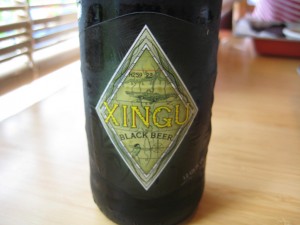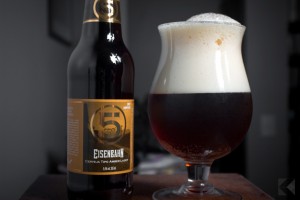World Cup Sipping: the Beers of Brazil
Olé, olé, olé, olé!
It’s time for the World Cup, the soccer competition that occurs every four years (please do not yell at me for calling it soccer and not football, I am aiming for clarity here.) This year, the games will be held all over Brazil starting on June 12. However, I’m not a sports writer, I’m a beer writer so instead of ranking the various teams around the world I’ll be discussing the beers of Brazil.
Brazil has had a lot of beer press over the last few years as the headquarters of InBev, the giant multinational corporation that acquired Anheuser-Busch in 2008. The country is known best for creating, exporting, and drinking light pilsners like Bavaria and Kaiser.
In the last several years, though, Brazil has been going through its own craft beer revolution like the U.S. and Europe and there are some craft breweries making some great beer. Most of it is tough to find in the U.S., but a few are imported and hey, that’s what beer trading is for right?
One of the most popular Brazilian beers in the U.S. is Xingu Black Beer, brewed by Cervejaria Sul Brasileira. This black lager has an interesting story, dating from 1986 when a group of Vermont women hired beer historian and anthropologist Alan Eames to help them explore the traditions of a rumored ancient black beer historically brewed in the Amazon jungle. Their travels exposed them to ingredients unique to the Amazon jungle, as well as the region’s historic female brewing influence. After months of learning about the black beer style in its indigenous habitat, Eames and his backers teamed up with a local brewery to make the beer, named after an Amazon River tributary where the beer-making tribes that they took their inspiration from lived.
As in North America, South America’s beer culture was heavily influenced by German immigrants who moved to the area in the 1800s. In fact, Blumenau, where Cervejaria Sudbrack is located, is home to the world’s second largest Oktoberfest celebration. Cervejaria Sudbrack, founded in 2002, which brews their Eisenbahn line of beers in strict accordance with the German Reinheitsgebot of 1516 is one such German-inspired brewery. Despite the German influence and tradition, Sudbrack’s Eisenbahn S.A.P.A (South American Pale Ale) drinks like a Belgian Pale Ale. Will this lead to a new style creation of the S.A.P.A. being a German-influenced ale with Belgian flavors and characteristics? Too soon to tell.
As its name suggests, Cervejaria Colorado in Ribeirão Preto focuses on American styles. Vixnu, its imperial IPA, is lauded by American craft beer drinkers for its well balanced hop flavor and aroma. At 9.5%, the alcohol is hidden nicely for a slightly warming, but smooth drinking DIPA. Vixnu appears to be in the U.S. market as well. Cervejaria Colorado also offers an American Brown Ale, an English IPA, and a Russian Imperial Stout.
If you are at Curitiba’s brand new stadium for the Honduras v. Ecuador game on June 20, the Australia v. Spain match on June 23, or the Algeria v. Russia game on June 26 (or one of several others), check out local brewery Cervejaria Bodebrown. It’s another craft brewery in the American tradition; they’ve even collaborated with Stone on a Cocoa IPA and Odell on a rye pale ale. Its Wee Heavy is, according to comments on Beer Advocate, “faithful to the style and still with its own personality,” with a deep, rich flavor and sweet notes of dried fruit and smoked malt. It’s a little known style in Brazil; Bodebrown may well be the only brewer in the country brewing it. The brewers dabble further in the UK brewing tradition with an English Dark Mild and English IPA, as well as Belgian styles like Dubbel, Tripel and Witbier.
Cervejaria Wäls is located in the same city as Estádio Mineirão, another World Cup host stadium in Belo Horizonte. Colombia, Greece, Costa Rica, England, Belgium, Algeria, Argentina, and Iran will all be playing there during the group stage. In between games, get to sampling Wäls’ variety of Belgian, American, and Czech style beers. Of particular note is the Wäls Tripel, providing a spicy, sweet flavor which hides its 9.0% ABV smoothly. Reviews of the beer reveal a common theme of surprise that a beer of this caliber and style was being brewed in Brazil. Also well reviewed is the even boozier Quadruppel, which at 11.0% ABV is a beast of a beer. The fact that these classic Belgian styles are so well executed shows that Cervejaria Wäls has a great deal of talent and professionalism behind their beer.
Just researching these beers and breweries has made me thirsty for a trip to explore the burgeoning craft beer scene of Brazil. I think I’ll hold off till after the World Cup, though - I hate a crowd.



